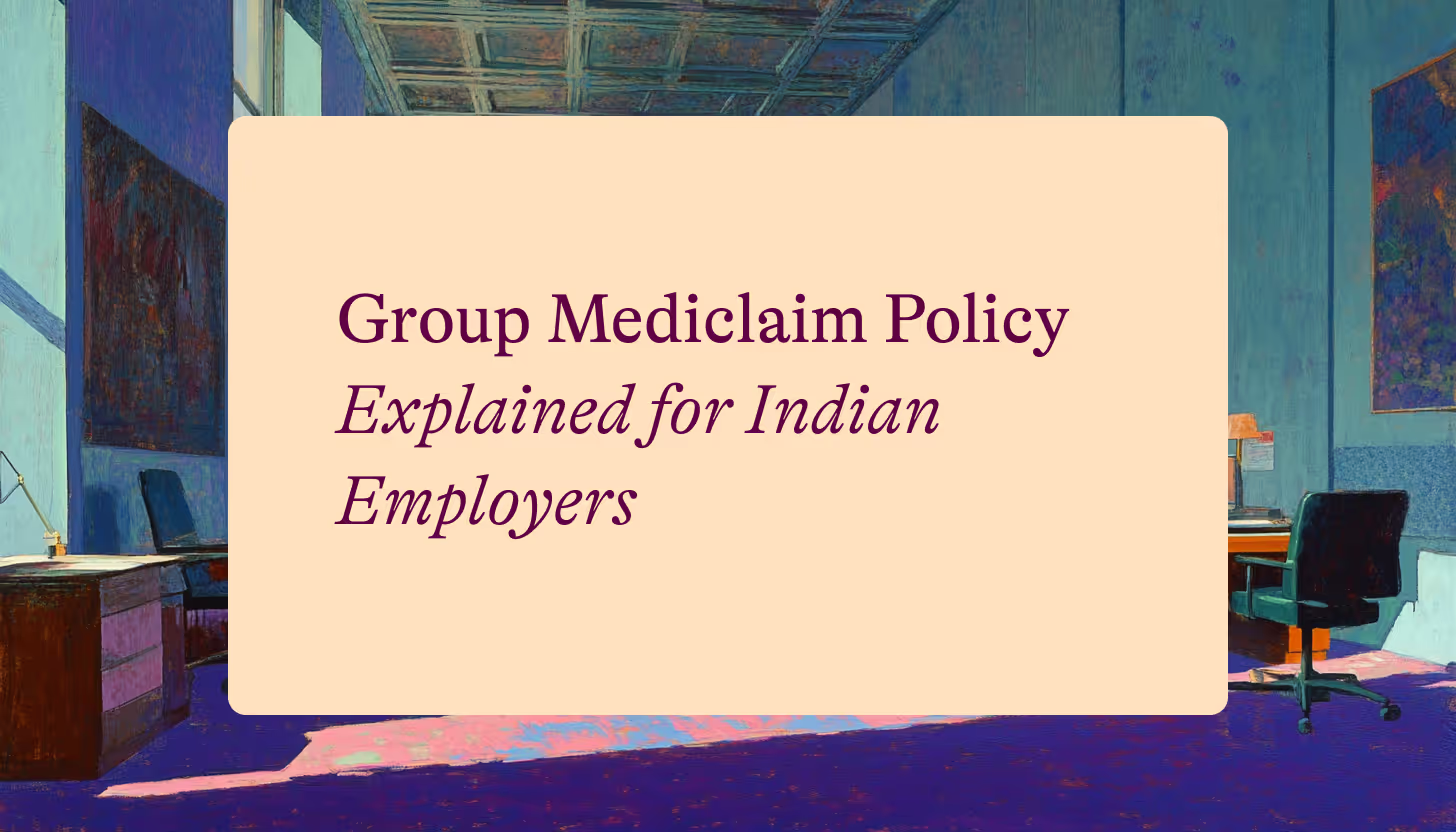A group health insurance is a health insurance plan that covers a group of people who work in the same organization. A group health insurance plan can additionally cover the family members of the employees, including spouses children and parents.
Health insurance is one of the most common employee benefits that organizations offer. It helps organizations offer peace-of-mind to employees from unplanned diseases and treatments. It also ensures that employees always take care of their health without delaying treatment due to financial constraints.
That said, many Founders and HR leaders wonder if it would be better just to let employee buy their own insurance (and then reimburse the cost) or go for a group health insurance. They wonder whether is any real advantage in setting up a group health cover. In this post, we will talk about why group health insurance can be a far superior choice to individual insurance.

1. Pre-existing conditions
A pre-existing condition is a medical illness or injury that you have before you start your health insurance. Conditions like diabetes, high blood pressure, thyroid, cancer, and sleep apnea are typical examples of pre-existing health conditions.
Almost all individual health insurance plans do not cover any treatments associated with a pre-existing condition. Some individual health insurance plans may cover pre-existing conditions after a long waiting period of 4 years, i.e. you need to continue the plan for 4 years to become eligible for a treatment associated with a pre-existing condition.
As you would imagine, one of the most common scenarios where you may need to use your health insurance is for a pre-existing condition. They tend to be chronic or long-term. This becomes especially relevant if you or your family member is 40 years or older.
With group health insurance offered by Plum, you can cover any pre-existing condition from day 1 of the policy.
2. Maternity
Coverage for maternity means you can claim your expenses related to pregnancy, including hospitalization, pre-hospitalization and post-hospitalization. Again, most individual health insurance plans don’t cover any expenses related to maternity. A few plans offer maternity as an add-on, but with a long waiting period of 9 months to 3 years.
The Indian government is doing its bit to ensure that organizations take care of their female employees by mandating minimum maternity leave. But organizations to go beyond that and ensure that female employees can also have peace of mind at the most essential stage of their life.
With group cover offered by Plum, you can opt for a maternity benefit starting from ₹25,000 to ₹1,00,000 based on where your team is located (since healthcare expenses vary by city) and your organization budget. The benefit starts from day 1 without any waiting period and covers any prenatal and postnatal expenses.
{{group-insurance-quote="/web-library/components"}}
3. Baby day 1 cover
Many of us know the upper age limit for getting insurance coverage (typically 80 years). But not many of us would know that the insurance plans also have a lower age limit. A newborn baby can only be covered once he/she completes 90 days. That comes as a major surprise to new parents. Most healthcare complications happen in the first few days & weeks when a baby is born.
With group cover offered by Plum, if you choose to cover your employees' children, you can opt-in for a Baby Day 1 Cover. That means that your baby's healthcare expenses are covered right from birth.
4. Waiting periods
Another common feature of individual health insurance plans is that they have a 2- to 4 years waiting period for treatments of common illnesses (even if these are not pre-existing conditions). Common examples of conditions that have a waiting period are cataracts, hernia, piles, hydrocele, and sinusitis.
In addition, all individual health insurance plans have 30 days for all diseases and treatments. You cannot use your insurance for the first 30 days except for accident cases.
With group cover offered by Plum, you can opt to waive off both the 2yr/4yr waiting periods on specific diseases and the 30-day waiting period on all diseases. That ensures that your team can use the health insurance right from the day you start.
{{group-insurance-quote="/web-library/components"}}
5. Parents cover
Lastly, an insurance plan allows individuals to cover their spouse and up to 4 dependent children. That means your employees can add their parents to their family floater plan. Parents (and especially retired parents) are the ones who need health insurance the most.
With group health insurance offered by Plum, you can allow your employees to cover both their parents. They can either add their parents or their parents-in-law.
Group health insurance, in summary, enables you to build a comprehensive health benefit for your employees and their family members, ensuring that they don’t have to worry about exclusions, waiting periods, and the myriad of terms & conditions.
With such comprehensive coverage, group health insurance is surprisingly more affordable than an individual health insurance plan. The premiums are between 30% and 50% lower than individual plans. With Plum, we have ensured that even a tiny startup with as few employees as 7 can get the advantage of volume pricing without any negotiations. We provide startups with pre-negotiated and transparent prices.
If you are an organization that hasn’t set up a health cover yet for your employees, this is a good time for you to start taking care of the health of your team and give your team peace of mind.
To get started, just visit www.plumhq.com and get started. All you’d have to do is submit details, and our instant premium calculator would share your premium in less than 2 mins so that you can have your employee health cover up and running in a day!
.avif)








.avif)
















